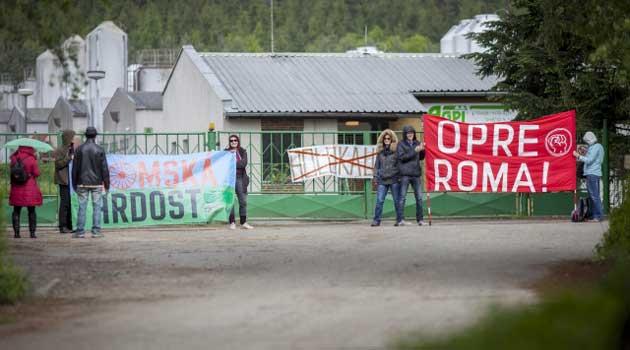Czech Republic: Blockade of pig farm on Roma Holocaust site ends, activists meet with farm owners

On Saturday, 17 May, activists ended the blockade of the pig farm at Lety by Písek through which they had launched a campaign for its closure. The farm is partially located on the site of a former WWII-era concentration camp for Romani people.
"The protest set itself high aims and ultimately managed to achieve progress. On Saturday, 17 May, the first negotiations took place between the activists and the shareholders’ board of the farm.The shareholders say they are willing to financially invest in moving the farm from the site. The board received the activists as partners, respected their view of this matter during the discussion, and expressed themselves in a way that showed respect for the Roma and the entire issue. For their part, the activists did their best to explain why they had undertaken the blockade," the activists have written in a press release.
Jan Čech, vice-chair of the AGPI board, also says the negotiations proceeded correctly. "The activists, however, are too young and don’t know all the requirements. This whole thing is not as simple as it seems to them. We are a joint-stock company where fundamental decisions must be voted on, everything must be thought through and then undergo an approval process," Čech told Romea.cz.
“The state should acknowledge its responsibility and clearly state that this problem belongs to society as a whole. It’s not just our problem. We are willing to finance the moving of the pigs, but the cost of barns, a new plot of land, and the building of roads can’t be borne by us,” said Čech.
"It seems that despite all of the efforts and struggles that have lasted for many years, real communication between the key actors has never taken place. These negotiations were the first step to solving this problem," the activists’ press release reads.
However, news server Romea.cz has determined that this claim is overstated, to say the least, as several state representatives have actually negotiated with representatives of AGPI over the years. In 1997, ministers Pavel Bratinka (ODA) and Jan Ruml (ODS) announced that they would propose that the government purchase the farm, demolish it, and have a dignified memorial to the Romani victims of the Holocaust erected there.
The AGPI company said at the time that they were willing to move the farm in exchange for reasonable compensation, which according to their estimates would be hundreds of millions of Czech crowns. "Even back then, during our negotiations with the Government, we proposed that we would cover the costs of transferring the animals – among other reasons, because each of us feels a responsibility for this state of affairs as a citizen," Čech told Romea.cz.
The question of buying and demolishing the pig farm has been reviewed by many Czech governments, ministers, and Human Rights Commissioners, starting with Petr Uhl, the first appointee to that post in the Czech Republic. Negotiations with the AGPI joint-stock company, which has owned the pig farm since 1994, always broke down because the cost of buying the existing farm and building a new one elsewhere was too high and no government has been willing to pay that price.
That has been confirmed by Gabriela Hrabaňová, who used to work for the Office of the Government. "It’s not true that no one ever met with the firm. I personally prepared the background information for negotiations with AGPI for [former Human Rights] Minister Džamila Stehlíková and [former Human Rights] Minister Michael Kocáb. We even looked at plots of land to which the pig farm might be moved with him and with South Bohemian Regional Governor Jiří Zimola," she told news server Romea.cz.
Nevertheless, Hrabaňová says Romani people themselves were not involved in those negotiations but remained in the background. Czech Human Rights Minister Michael Kocáb did ultimately succeed in pushing through extensive improvements to the memorial site.
“A blockade is not about words, it’s about effective action. We will continue down this path – genuine actions, not empty words. We want there to be more real actions like this one, negotiations, more agreements signed and promises realized. Now the hard work really begins,” said activist Ivana Čonková, who was present during Saturday’s negotiations with the farm’s shareholders.